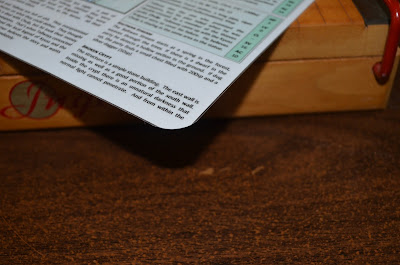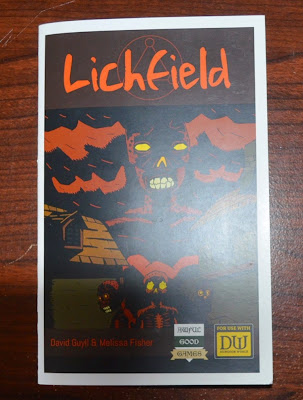 |
| A GM Badge I created. I need to make this an actual badge and where it at the next con I go to. |
Most articles I've read about the first job of GMing is make sure the game is fun. I think there is a flaw in this way of thinking. I can't make sure the rest of the players are going to have fun. You never know what kind of mood a player may be in when he arrives. My responsibility as a GM to put my players in the best situation to have a great time. So what kind of work do I need to do to give my players the best experience?
Know Your Players
This is the biggest asset I have. I've been gaming with my group for years now. There has been an infusion of new blood, but I've played with them long enough to know what kind of players they are and what type of game they favor. So when I'm creating a situation or adventure I am always thinking of one of them in particular.
Dividing the Time
Or sharing the spotlight. I want to make sure every player is engaged with the situation. This is why I favor a group of four. Obviously, some players will be more interested in certain events than others. I don't think trying to equally divide time serves anyone well. It feels forced. I know it and my players will know it.
Sessions are going to have a player get more time in the spotlight. What I don't do however is ignore the others. Often times while one is basking in the A plot, I'll have one or two B plot threads weaving under the main focus at the time. My players love the scheming part of things. Plans and skullduggery are sweet desserts to them.
Energy
As the GM, I am the engine of the game. It goes forward as fast as I do. So it's important to keep my energy high. Not like a spastic flailing around, look I have no bones in my arms kinda way, but rather bring energy to the session that excites my players and it allows them to become more involved.
Moving it Along
As I mentioned above, my players love to scheme. But sometimes the scheming can become over indulgent. Action must be had. Often how I keep the planning stages reasonable, there is a time element that I often introduce. Like the princess in the orc tower is grunt food in a few hours. The party can discuss which wall to scale and what would be the best rope while the orcs fight over the legs. Or they can move in with purpose. Improvise. Adapt. Overcome.
Being Prepared
As a GM you have the most work to do before a game. Duh. Ideally, I prepare for a game by looking over notes of previous games and selecting plots the players have followed or created themselves and pick-up where we left off. Make sure I have my NPCs in order and in easy reach. Also, I make a short list of ten random names because the players always ask me who this person is and this way I've got a name ready to go. Then I put a little note beside that name. Adventures. I've got a few of those laying around. But I try to give it a read through before gaming so I have a little better grasp of it. Even if I wrote it. The better I know the adventure the better I can wing it and adapt to the players.
Player Freedom
I am a huge fan of allowing players to drive the game where they want. While I provide the sandbox, I want them to feel free to explore what they enjoy. That doesn't mean I won't throw things at them because in the world I run some events are going to happen despite the players actions. A war, a natural disaster or the ambush on the road. If they don't choose that road, they will hear about how people are getting robbed on the road.
Conclusion
Nothing earth-shattering. Nothing new. I approach my games with the intent of having a good time with my friends. But also to do some serious gaming. I love it when the players drive their own plots and are genuinely surprised by some of the obstacles I throw into their path.
Until next time, pay homage to Unosum, God of Quantum Ones and Lord of Rock Bottom. May he never get tired of your struggles and upon your failures, may his laughter ring in your ears.

















































